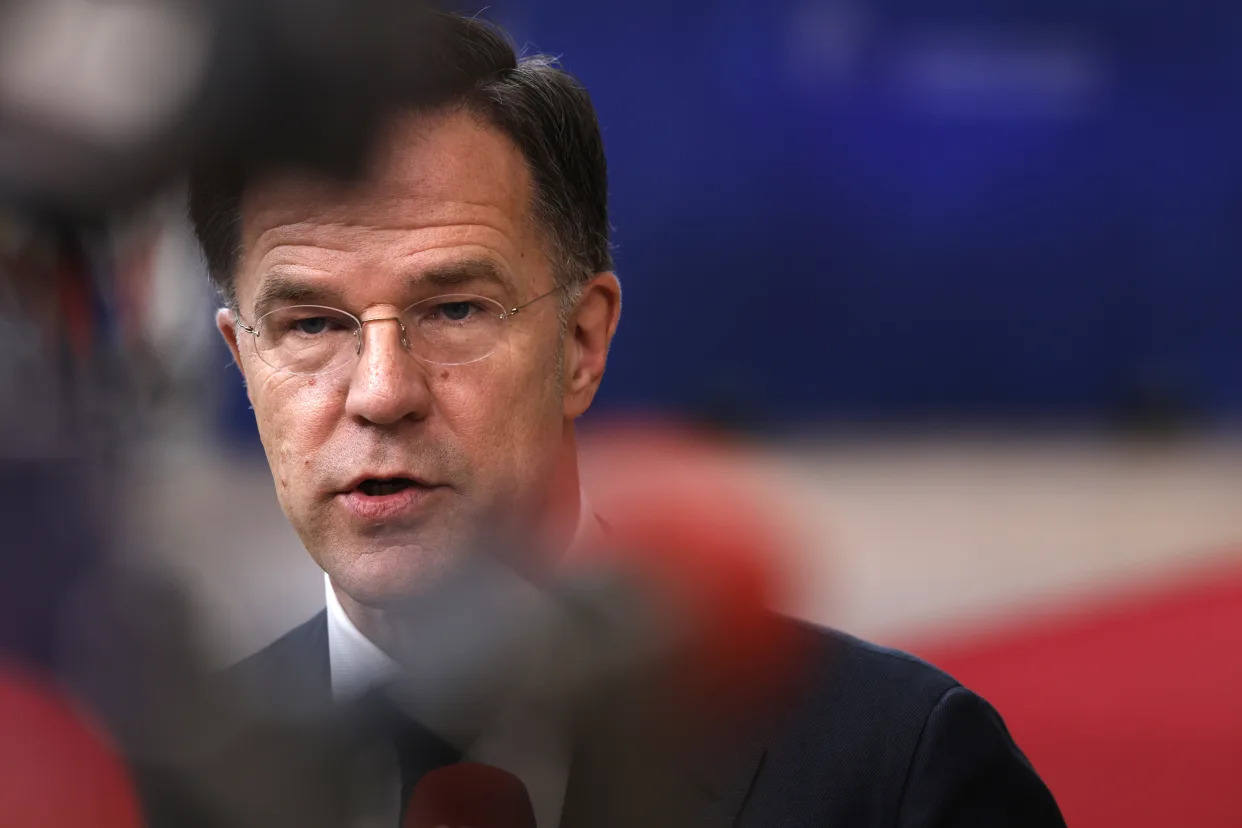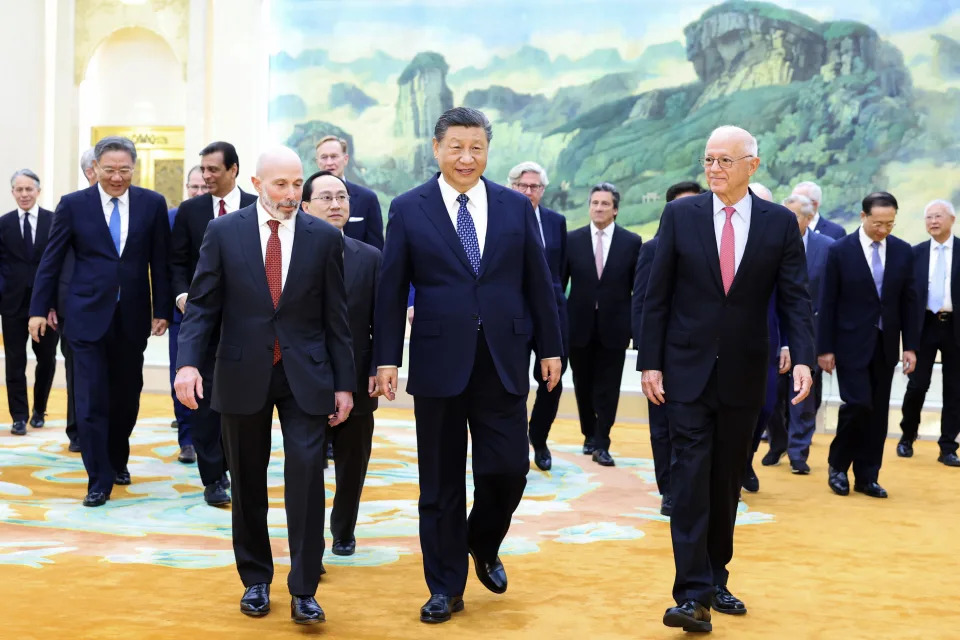Chinese leader Xi tells Dutch PM that restricting technology access won't stop China's advance

Chinese leader Xi Jinping told visiting Dutch Prime Minister Mark Rutte on Wednesday that attempts to restrict China's access to technology will not stop the country's advance.
Dutch Prime Minister Mark Rutte is meeting with Chinese leaders Wednesday, March 27, 2024 for talks that are expected to include the wars in Ukraine and Gaza and Dutch restrictions on the export of semiconductor manufacturing equipment to China.
The Netherlands imposed export licensing requirements in 2023 on the sale of machinery that can make advanced processor chips. The move came after the United States blocked Chinese access to advanced chips and the equipment to make them, citing security concerns, and urged its allies to follow suit.
An online report from state broadcaster CCTV did not mention the chip machinery, but quoted Xi as saying that the creation of scientific and technological barriers and the fragmentation of the industrial and supply chains will lead to division and confrontation.
"The Chinese people also have the right to legitimate development, and no force can stop the pace of China’s scientific and technological development and progress,” Xi said, according to CCTV.
Rutte and Trade Minister Geoffrey van Leeuwen were also expected to discuss the wars in Ukraine and Gaza during meetings with Xi and Chinese Premier Li Qiang, a Dutch government release said ahead of their trip.
China has taken a neutral position on the Ukraine war, providing Russia with diplomatic cover and economic support through trade. That stance has angered and frustrated much of Europe, which sees Russia as the aggressor and Ukraine as the victim.
"I’m going to try to convey how important it is for the Netherlands, for our security, that Russia does not win this, that Russia loses, and that we also ask a good friend like China to understand that,” Rutte said in a video message recorded on a street in a historic tourist district in Beijing.
In the video, posted on X, he also said that he would bring up intellectual property rights, subsidies and human rights.
Dutch company ASML is the world’s only producer of machines that use extreme ultraviolet lithography to make advanced semiconductors. In 2023, China became ASML’s second-largest market, accounting for 29% of its revenue as Chinese companies bought up equipment before the licensing requirement took effect.
Beijing has repeatedly accused the U.S. of trying to hold back China's economic development by restricting access to technology. In response, Xi has launched a campaign to develop home-grown chips and other high-tech products.
“China always opposes the U.S. overstretching the concept of national security and making various excuses to coerce other countries into imposing a technological blockade against China,” Foreign Ministry spokesperson Wang Wenbin said in January.
ASML, the Netherlands’ largest company, recently threatened to leave the country over anti-immigration policies that may impact the company’s ability to hire talent, leaving government officials scrambling to ensure that the firm does not leave.
Van Leeuwen said this week in an interview with The FD, a Dutch business newspaper, that protecting the interests of ASML is a top priority but acknowledged that national security comes before economic interests.
NATO and its growing ties with Asia also may come up at Wednesday’s talks. Rutte is a leading candidate to be the next head of NATO, an organization that China has criticized for provoking regional tensions and making forays into the Asia-Pacific region.
Xi Meets US CEOs, Seeking to Boost Confidence in China’s Economy
President Xi Jinping met with a group of American business executives in Beijing including Blackstone’s Stephen Schwarzman and Qualcomm Inc.’s Cristiano Amon as China is seeking to restore confidence in the economy and keep relations with the US on a stable footing.
The Chinese leader on Wednesday met with representatives from American business, strategic and academic communities, the official Xinhua News Agency said. State broadcaster CCTV named a number of executives present at the meeting and said Xi took a group photo with the participants before the event.
China is trying to show it welcomes foreign businesses, but whipsawing tensions with Washington, a shaky economic recovery and raids on consulting firms have damped investor enthusiasm. For global executives, the meeting was a chance to underscore interest in participating in the giant Chinese market despite deepening geopolitical tensions and moves in China to favor local competitors.
Other attendees include Raj Subramaniam, chief executive officer of FedEx Corp.; Evan Greenberg, CEO of the insurer Chubb Ltd.; Stephen Orlins, president of the National Committee on US-China Relations; Craig Allen, president of the US-China Business Council; and Mark Carney, chairman of Bloomberg Inc., according to CCTV.
US-China ties have stabilized after Xi met with President Joe Biden in San Francisco in November, although they continue to dispute over a broad range of issues spanning trade curbs and accusations of cyberattacks.
On Tuesday, China said it filed a complaint to the World Trade Organization over US electric vehicle subsidies. Earlier in the week, the US and UK accused state-backed Chinese hackers of targeting politicians, companies and dissidents, as well as stealing troves of British voter data.
Relations with the US risk worsening with former President Donald Trump already vowing massive tariffs on the campaign trail that could shrink trade between the two nations to practically nothing. Trump’s rhetoric may add pressure on Biden to take harsher measures in the run-up to election day.
Read More: Tim Cook’s Love for China Helps Xi Fight Fears of Economic Slump
China appears to be ramping up outreach to foreign investors as it seeks to achieve an annual growth target of around 5%, a goal deemed ambitious by some economists. The Ministry of Commerce in January pledged to hold a round-table meeting with foreign companies every month to hear and address their concerns.
However, investors have complained about whiplash as China pursues its dual goals of development and security, with executives hearing warm words only to then see authorities probe consultancy firms, expand a vague anti-spy law and restrict access to data. A structural economic slowdown has also led executives to re-evaluate the balance between risks and rewards for operating in the country.
Prior to the pandemic, Xi used to hold more regular gatherings with executives at events such as the annual Boao Forum for Asia, which is sometimes described as China’s Davos. He’s not expected to attend this year’s conference, which started Tuesday in Hainan.
Read More: US CEOs Extend China Stay on Last-Minute Invite to Meet Xi
Many US CEOs are in Beijing for the annual China Development Forum, which gathers together global business leaders and Chinese officials. Some executives attending the confab extended their stay or moved previously planned appointments in order to meet with Xi after receiving a formal invitation last week, Bloomberg News reported.
China's Xi issues a positive message in meeting with U.S. business leaders as relations improve
Chinese President Xi Jinping, center, walks with representatives from American business, strategic and academic communities at the Great Hall of the People in Beijing, March 27, 2024
China’s nationalist leader Xi Jinping has called for closer trade ties with the U.S. during a meeting with top American business leaders in Beijing that comes amid a steady improvement in relations that had sunk to the lowest level in years.
Xi emphasized Wednesday the mutually beneficial economic ties between the world’s two largest economies, despite heavy U.S. tariffs on Chinese imports and Washington’s accusations of undue Communist Party influence, unfair trade barriers and theft of intellectual property.
China’s economy has struggled to recover from severe self-imposed restrictions during the COVID-19 pandemic that it lifted only at the end of 2022, but Xi said China was again contributing to world economic growth in the double digits percentage-wise.
“Sino-U.S. relations are one of the most important bilateral relations in the world. Whether China and the United States cooperate or confront each other has a bearing on the well-being of the two peoples and the future and destiny of mankind,” Xi was cited as saying by China's official Xinhua News Agency.
Participants at the meeting included Stephen A. Schwarzman, the billionaire head of investment firm Blackstone.
Trade and tariffs have increasingly drawn attention in the runup to the U.S. presidential election, and the Biden administration has shown little sign of moderating punitive measures against Chinese imports imposed by his predecessor and assumed rival in the November polls, Donald Trump.
U.S. officials have renewed concerns over Chinese industrial policy practices and overcapacity, and the resulting impact on U.S. workers and companies, that they blame in part on China's massive trade surplus that amounted to more than $279 billion last year, its lowest level in about a decade.
China's economy has been bogged down by a crisis in its property market in which builders are struggling under mountains of debt and buyers are paying off loans on apartments that may never be completed. Other issues, such as an aging population and high youth unemployment, are prompting China's leaders to lean more heavily on boosting export manufacturing to make up for weak demand at home.
At the same time, scores of foreign firms including Apple rely on China-based manufacturers as key links in their supply chains, along with the country's 1.3 billion consumers for a high percentage of their global sales.
China's formerly highly abrasive tone toward the U.S. has softened in recent months, particularly since Xi and Biden met in San Francisco in November. Officials such as Secretary of State Antony Blinken have visited, and Treasury Secretary Janet Yellen is reportedly due to to travel to China again to meet top leaders next month.
But Xi's administration has maintained a hard line on issues it considers its “core interests.” Those include its claims to virtually the entire South China Sea, the self-governing island democracy of Taiwan — a close American ally — and its heavy-handed rule of outlying regions such as Hong Kong, Tibet and Xinjiang.
An ardent nationalist and son of one of the founders of the People's Republic, Xi appears determined to maintain strict party control while drawing in foreign investment to shore up the economy.
“The respective successes of China and the United States create opportunities for each other," Xi was cited as saying by Xinhua. “As long as both sides regard the other as partners, respect each other, peacefully coexist and join together for win-win results, China-U.S. relations will improve.”
- Questions and Answers
- Opinion
- Story/Motivational/Inspiring
- Technology
- Art
- Causes
- Crafts
- Dance
- Drinks
- Film/Movie
- Fitness
- Food
- Games
- Gardening
- Health
- Home
- Literature
- Music
- Networking
- Other
- Party
- Religion
- Shopping
- Sports
- Theater
- Wellness
- News
- Culture
- War machines and policy




